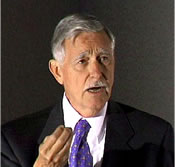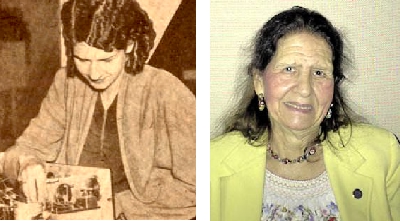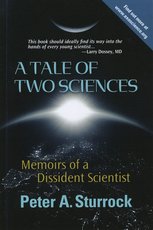
Halton Arp, dissident scientist
The Whistle (Newsletter of Whistleblowers Australia), No. 65, January 2011, pp. 17-20
Because of my research on suppression of dissent in science, I regularly receive correspondence from scientists telling me about their experiences and asking for advice.
Below are five unsolicited emails sent to me in 2007. Some of them I have shortened. Furthermore, I have changed names and details about the research to hide the identity of the correspondents. For example, in the first letter, I made up the term “xitiferation” and the associated references to “extension” and “atypicals.”
My responses are pretty much as I wrote them, except that in several cases I’ve omitted links to my articles. I often recommend “Challenging dominant physics paradigms” (co-author: Juan Miguel Campanario), and “Advice for dissenting scientists.”
If others have examples of how they respond to whistleblowers and dissidents, I would be pleased to consider them for The Whistle.
Note: the photos are of dissident scientists, with their actual names.
—————
From: Robert R Zantos
Subject: Suppression of my article on unusual xitiferation
Dear Prof. Martin:
1. My group has had publications indicating that the xitiferation-only theory is incorrect and that there is another form of cellular activity which, interacting with xitiferation, is the basis of extension.
2. In answer to this dilemma, the xitiferation-only Establishment has claimed that extension occurs via unusual xitiferation. It is a huge establishment now, lushly funded.
3. I have written (with Dr. Lodge) a commentary showing that the existence of atypicals negates unusual xitiferation; in this commentary, I also describe the crucial relationship between atypicals and features of organisms.
4. To date, 6 journals have rejected this commentary.
5. We have committed two major sins: A. We are confronting a doctrine that is hugely profitable to the Establishment; B) we are right.
I hope you can help us get published in the interest of open scientific debate and in order for us to get the proper credit, or discredit.
Robert R Zantos, M.D.
• • •

Halton Arp, dissident scientist
Response 1
To: Robert R Zantos
From: Brian Martin
Subject: dealing with suppression
Dear Robert,
Unfortunately there are seldom quick solutions to marginalisation. Truth alone is hardly ever enough.
I think you need to treat your challenge to the establishment as a long-term project, and work out a long-term strategy. Even should your six-times-rejected paper be eventually published, that does not guarantee recognition. It could easily just be ignored.
It may be worth considering some of the following options.
• Continued efforts to publish in leading journals.
• Publication in lower-status journals.
• Personal contact with scientists supporting the dominant view, especially those without high commitments to it, to find possible allies. Students and junior researchers may be especially promising.
• Analysis of papers and discussion with individuals to find the points of greatest leverage for mounting your challenge.
• Development of an attractive website with a concise summary of the key issues, copies of papers and detailed critiques of the dominant position.
• Taking the issue to wider audiences, including scientists in related fields and perhaps beyond, for example through talks and popular articles.
Regards,
Brian
—————
From: Johnston
To: <bmartin@uow.edu.au>
Subject: after reading “Challenging Dominant Physics Paradigms”, something that may interest you
Dear Brian Martin
I started investigating cloud expropiation, spending countless hours in our local technical library, and soon arrived at the conclusion that expropiation theory made no sense.
By the mid to late 1990s I was writing papers aimed at physics journals. My only qualification is an honours degree (4 years in my country) in physics. I soon learned not to tell who I was or why I was doing this. Eventually I was led to Physics Tomorrow. The referees basically said, in so far as you can explain everything, you have no proof. I found a 2001 paper from a group in another country studying extreme condensation (signatures of dissolving clouds). They provided a graph for the signatures required to expropiate various sized clouds at various pressures.
It was an exact fit to one of my equations. Now the referees had a quandary. I had found the proof that they said I could not find. So they started probing into who I am. Well sadly I am not one of them, not having a PhD in expropiation research. So the referees wanted no part of what I said. The editor published my paper anyway, because I did what the referees requested.
Cheers, god bless, Johnston Friendly
• • •

Robert G Jahn, dissident scientist
• • •
Response 2
To: Johnston Friendly
From: Brian Martin
Subject: challenging dominant theory
Dear Johnston,
The way you’ve been treated is disgraceful, though fairly much the standard, sorry to say. The worst part is the way you’ve been dismissed because you’re not a professional researcher. This is the usual treatment even though it goes against the norm that ideas should be judged on their merits, not on who’s presenting them.
One way around this prejudice is to obtain an honorary position (unpaid affiliation) at a university, to give you credibility when writing to journals. Probably it would be worth contacting dissident physicists who are at universities and asking their advice about this.
Your best bet for publishing your work is directly on the web. As well as your book-length treatise, I would advise having a short account of the key ideas, article length, as well as a briefer overview of your findings. And you should post your Physics Tomorrow paper on the site as well. It’s useful to look for websites that allow a non-expert to get a sense of what the issues are all about, and model your own site on one of your choosing.
Regards,
Brian
—————

Domina Eberle Spencer, dissident scientist
—————
From: Glennda Francesca
To: <bmartin@uow.edu.au>
Subject: suppression of data
I am in the process of writing a paper about my ordeal and the consequent suppression of data on the prevalence of jamaliasis diagnosis and drug treatment. The study was part of a multi-million dollar, multi-site investigation. Data from the site with notably high prevalence findings was suppressed as a result of false allegations of scientific misconduct, perhaps mismanagement of the investigation, and irresponsible journalism. I would appreciate any references of which you may be aware that speak to the issue of ensuring press scrutiny while also protecting academic venues and publications from falling prey to the increasingly popular trend in journalism to engage in reputation assault over careful issue analysis.
Glennda Francesca
• • •
Response 3
From: Brian Martin
To: Glennda Francesca
Subject: Fwd: suppression of data
Dear Glennda,
Congratulations on your courage in speaking out about jamaliasis diagnosis and treatment and for surviving the onslaught.
I’m not sure that the media are any worse than before. Whistleblowing is increasingly recognised by the media; scientific fraud remains a hot media topic. Your persecutors were able to use these news priorities in framing the story as whistleblowing about your alleged scientific misconduct — not the first time it’s been done. But in your case it didn’t work — in many cases, unfortunately, it does.
It’s excellent that you’re writing about what happened. These sorts of stories are highly valuable to others experiencing the same sort of thing.
You could use the backfire framework that I’ve developed to look at the tactics used by your opponents. By accusing you of misconduct they deployed the tactics of devaluation and intimidation, and I’d expect that cover-up, reinterpretation and official channels were involved too. Going public and gaining support from professionals was a powerful way of responding. If you can tell your story in terms of tactics used against you and the ways you responded to them, this will make it really useful to others.
Regards,
Brian
—————
From: Smithy Sketchner
To: <bmartin@uow.edu.au>
Subject: suppression of dissent in inner physics
Hi Brian:
I was fired from my job as a research assistant at a university after my boss, a professor, and I had differences over a report that I wrote. A big part of my job was extra analysis. The report I wrote exposed a number of problems with the instrument that were omitted from some reports that my boss wrote for the government agencies that were funding and overseeing the project.
After I completed my report I sent it to my boss and I told him that I thought the agencies should read it. He disagreed, saying my report had too many mistakes in it. Soon after this, representatives from those agencies were coming to our university to meet with us to discuss the instrument. About two days before the meetings my boss told me I could not freely discuss my report with the agencies. Then I was told I was not permitted to attend the meeting.
About two weeks later the project leader from one of the agencies wrote to tell me my report had “a lot of valid points” and was “extremely useful.”
Cheers, Smithy
• • •

Tom Van Flandern, dissident scientist
Response 4
To: Smithy Sketchner
From: Brian Martin
Subject: suppression of dissent
Hi Smithy,
What you’ve described certainly can be described as suppression of dissent. If your supervisor has tried to hide inadequacies from the funding agencies, this is a form of deceit, fraud, corruption, call it what you like. You’ve tried to be honest about problems and that seems to have cost you your job.
You ask whether your supervisor could be fired for his actions. It’s pretty hard for any subordinate to bring down a supervisor, even for serious transgressions, because people higher up almost always support the line of command.
It’s very unlikely that official processes — such as complaining to university officials, complaining to the funding agency or going to court — will help you in the slightest. Publicity is the probably the only tool for exerting much leverage, and even then dismissal seems unlikely. However, publicity could damage his scientific reputation quite seriously, which is a major impact.
Regards,
Brian

Peter Sturrock, dissident scientist
—————
From: Ernest Elgans
To: bmartin@uow.edu.au
Subject: Defamation of Scientists
Dear Brian
I wonder if you would care to venture an opinion as to whether the proposed broadcast of the Durkin “Great Global Warming Swindle” could constitute grounds for a class action suit for defamation and damages on behalf of scientists and the professional societies that represent them.
I believe that it may because it asserts broadly that scientists falsify their data for personal gain. Because scientists working in “public good” research (ecologists, climatologists, etc.) rely substantially on the trust and goodwill of the community to fund their research (and salaries) this could be very damaging. Also, the trust and goodwill between the community and scientists is one of the very few compensations for pursuing a poorly paid and very insecure career path. The loss of, or damage to, this trust and goodwill is, I think, the essence of defamation.
What do you reckon?
Dr Ernest Elgans — a concerned scientist
• • •

• • •
Response 5
To: Ernest Elgans
From: Brian Martin
Subject: Fwd: Defamation of Scientists
Dear Ernest,
I’ve never heard of a class action defamation suit, but even if it’s possible I think it would be a mistake. Suing, or making other threats, can easily be painted as censorship and be used to generate greater support for the climate change sceptics. It’s far more effective to respond in a factual, calm, dignified way, using the swindle programme to generate more attention to global warming.
Sue Curry Jansen and I have written a couple of papers about how censorship can backfire. One example is the attacks on Bjørn Lomborg, author of The Skeptical Environmentalist. I don’t agree with Lomborg but I think it was a mistake to attack him personally.
Regards,
Brian

Charles Darwin, dissident scientist